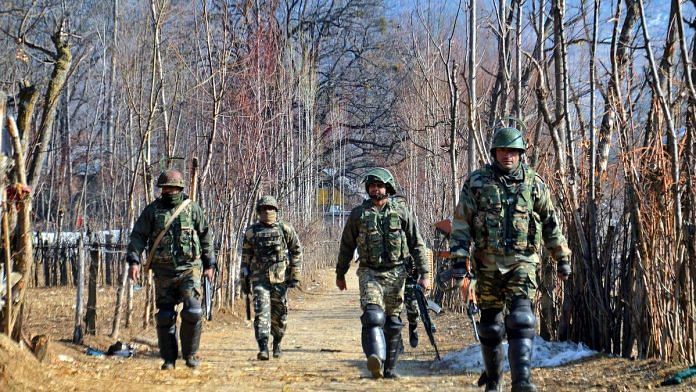New Delhi: India could have got its first Chief of Defence Staff (CDS) in the 1950s but a tussle between the then Defence Minister V.K. Krishna Menon and Army chief Gen. K.S. Thimayya along with the fear of a single military man becoming all-powerful prevented it, Congress leader Jairam Ramesh writes in his new book.
The creation of the post of CDS — which finally saw the light of the day on 30 December last year with Gen. Bipin Rawat assuming the four-star position — was something that Louis Mountbatten, India’s last Viceroy, had been pushing for with then Prime Minister Jawaharlal Nehru and Menon, the book says.
‘A Chequered Brilliance — The Many Lives of V K Krishna Menon’ written by Ramesh was published last month.
The book delves into the various aspects of Menon’s life such as his focus on Pakistan as an enemy, his inability to read China and the way he ganged up with Gen. P.N. Thapar and Lieutenant Gen. B.M. Kaul against Gen. Thimayya. Menon was the country’s defence minister when India lost the 1962 war with China.
The book also mentions the shocking fact about how Lieutenant Gen. J.N. Chaudhuri moonlighted as a correspondent for a British-owned Kolkata newspaper. Chaudhuri later became the Army chief.
Also read: Stop celebrating CDS. Gen Rawat will barely be able to command forces thanks to bureaucracy
The question of CDS
“Mountbatten had been pressing both Nehru and Krishna Menon to appoint a chief of defence staff (CDS) who would have overarching authority over the army, navy and air force, and has been suggesting Thimayya’s name for the post,” according to the book.
“Krishna Menon resented this lobbying, and in any case, was against the idea of a CDS, thinking it would give too much importance in policy to a single military man.”
Ramesh in his earlier book, Intertwined Lives, had mentioned that in December 1971, then Prime Minister Indira Gandhi, goaded by Army chief Gen. Sam Manekshaw, had proposed the creation of CDS, but the proposal was rejected by Gandhi’s powerful principal secretary P.N. Haksar.
The fight for post of Army chief
Even though Gen. Thimayya was appointed by Menon, there was a rift between the two, Ramesh wrote in the book, citing multiple incidents. Such was the mistrust and discontent between them that Gen. Thimayya resigned, only to withdraw it later.
“Thimayya would recommend Lt Gen. S.S.P. Thorat as his successor but that would be turned down by Krishna Menon and thereafter by the Prime Minister as well…Instead, Lt Gen. P.N. Thapar was selected as the fifth Army chief invoking the seniority criteria, which had been ignored while appointing Thimayya,” says the book.
The book said that Thapar, who led the forces in the 1962 debacle and became the only Army chief ever to have resigned while in service, was actually working with Menon, who, it was feared, wanted to have his supremacy over the forces.
The book mentions an incident when Gen. Thapar wrote a “Personal and Top Secret” letter to Thimayya on 23 April 1961, a fortnight before the latter’s retirement, making 13 specific allegations against him, including that of hobnobbing with arms dealers. On the same day, he wrote a separate letter to the Thorat, making five allegations against him.
“Thapar would not have written these letters without Krishna Menon bamboozling him. This was the defence minister at his pettiest and meanest,” Ramesh writes in the book.
He added that Menon had a co-conspirator in this “sordid episode” and that was Lt Gen. B.M. Kaul.
Quoting Thorat’s son, whose name isn’t mentioned in the book, Ramesh writes that Thimayya had sent Thorat’s name as his successor to the President in his capacity as the Commander-in-Chief of the Armed Forces.
“The President (Rajendra Prasad) approved it and forwarded it to the government. The Government (Prime Minister and defence minister) sent the file back to the President with a request ‘Please reconsider’. The President did not take long to send the file back reiterating his approval to Thorat. The government stuck to its guns and went ahead and appointed Thapar, who was a notch above in seniority…,” Ramesh writes.
Interesting is the fact that while both Thimayya and Thorat responded to Thapar’s allegations and retired from service, a year later after the first wave of Chinese attack in October 1962, which led to Menon’s and Thapar’s resignations also, Nehru personally brought Thimayya and Thorat as members of the National Defence Council, which was formed in November 1962.
Also read: CDS & 3 chiefs must speak in cryptic military language and not get provoked by Indian media



